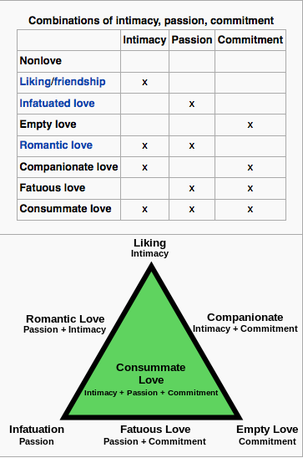Triangular Theory of Love by Robert Sternberg

The triangular theory of love is a theory of love developed by psychologist Robert Sternberg. In the context of interpersonal relationships,
"the three components of love, according to the triangular theory, are
an intimacy component, a passion component, and a decision/commitment
component."[1]
The three components, pictorially labeled on the vertices of a triangle, interact with each other and with the actions they produce so as to form seven different kinds of love experiences (nonlove is not represented). The size of the triangle functions to represent the "amount" of love—the bigger the triangle, the greater the love. The shape of the triangle functions to represent the "style" of love, which may vary over the course of the relationship:
- Intimacy – Which encompasses feelings of attachment, closeness, connectedness, and bondedness.
- Passion – Which encompasses drives connected to both limerence and sexual attraction.
- Commitment – Which encompasses, in the short term, the decision to remain with another, and in the long term, plans made with that other.
The three components, pictorially labeled on the vertices of a triangle, interact with each other and with the actions they produce so as to form seven different kinds of love experiences (nonlove is not represented). The size of the triangle functions to represent the "amount" of love—the bigger the triangle, the greater the love. The shape of the triangle functions to represent the "style" of love, which may vary over the course of the relationship:
- Nonlove "refers simply to the absence of all three components of love. Nonlove characterizes the large majority of our personal relationships, which are simply casual interactions."
- Liking/friendship is "used here in a nontrivial sense. Rather, it refers to the set of feelings one experiences in relationships that can truly be characterized as friendship. One feels closeness, bondedness, and warmth toward the other, without feelings of intense passion or long-term commitment.
- Infatuated love: "infatuation results from the experiencing of passionate arousal in the absence of intimacy and decision/commitment...like Tennov's limerance." Romantic relationships often start out as infatuated love and become romantic love as intimacy develops over time. Without developing intimacy or commitment, infatuated love may disappear suddenly.
- Empty love is characterized by commitment without intimacy or passion. A stronger love may deteriorate into empty love. In an arranged marriage, the spouses' relationship may begin as empty love and develop into another form, indicating "how empty love need not be the terminal state of a long-term relationship...[but] the beginning rather than the end."
- Romantic love "derives from a combination of the intimate and passionate components of love...romantic lovers are not only drawn physically to each other but are also bonded emotionally" - bonded both intimately and passionately, but without sustaining commitment.
- Companionate love is an intimate, non-passionate type of love that is stronger than friendship because of the element of long-term commitment. "This type of love is observed in long-term marriages where passion is no longer present" but where a deep affection and commitment remain. The love ideally shared between family members is a form of companionate love, as is the love between close friends who have a platonic but strong friendship.
- Fatuous love can be exemplified by a whirlwind courtship and marriage - "fatuous in the sense that a commitment is made on the basis of passion without the stabilizing influence of intimate involvement."
- Consummate love is the complete form of love, representing an ideal relationship which people strive towards. Of the seven varieties of love, consummate love is theorized to be that love associated with the “perfect couple.” According to Sternberg, these couples will continue to have great sex fifteen years or more into the relationship, they cannot imagine themselves happier over the long-term with anyone else, they overcome their few difficulties gracefully, and each delight in the relationship with one other. However, Sternberg cautions that maintaining a consummate love may be even harder than achieving it. He stresses the importance of translating the components of love into action. "Without expression," he warns, "even the greatest of loves can die." Thus, consummate love may not be permanent. If passion is lost over time, it may change into companionate love.